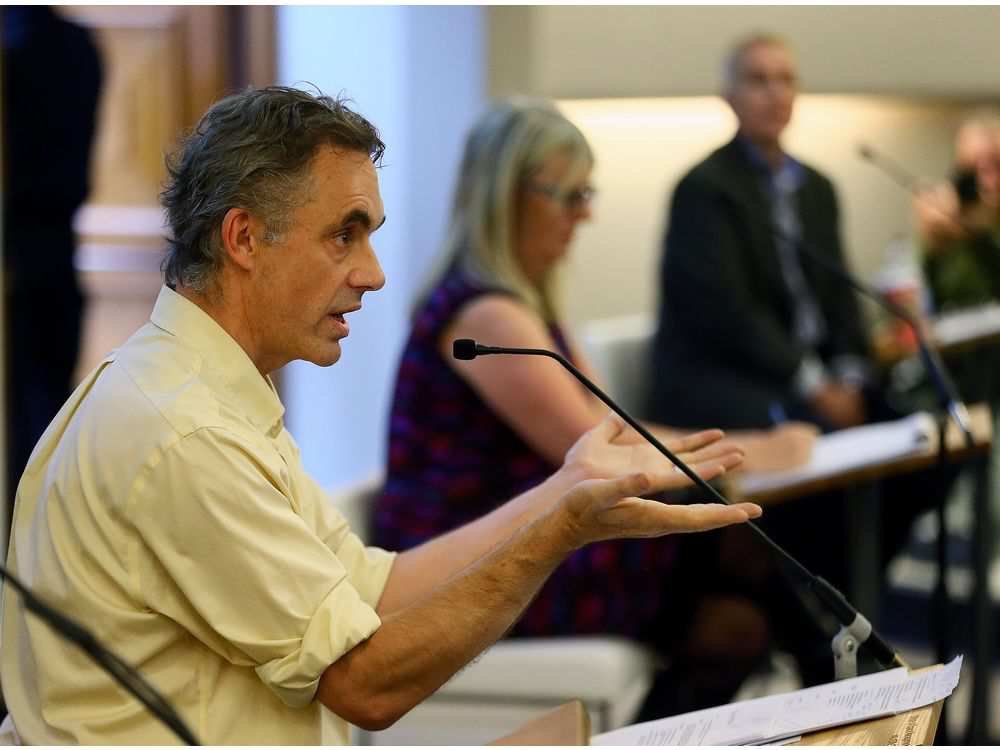
Talende imod tvungen brug i tale var Jordan Peterson, psykologprofessor ved University of Toronto, som fastholdt at det reflekterede en ideologisk skadelig og videnskabelig ugyldigt forsøg på tankekontrol. Petersons holdning blev forfægtet af Brenda Cossman, en lovprofessor ved samme universitet og direktør for Bonham Centret for Sexuelle Diversitetsstudier; og Mary Bryson, en uddannelsesprofessor ved University of British Columbia. Peterson's opponenter argumenterede grundlæggende for at påtvunget tale var begrundet hvis det hjalp med at reducere ulighed og vise respekt og medfølelse for marginaliserede grupper.
Kommentar: Denne artikel er delvis oversat til dansk af sott.net fra: Canadian professor: Ideological authoritarianism, assault on pursuit of truth have caused universities to lose their way
Although the event proceeded as planned, and was not disrupted by the pulling of fire alarms or other manifestations of the heckler's veto, the threat to Peterson's academic career continues. Take, for example, Mary Bryson's comment during the debate that much of what Peterson asserted constituted "hate propaganda." If this assessment of Peterson's position is accepted, he could suffer reprisals for future utterances.
While the events of the past month should concern any supporter of free speech, perhaps the most disturbing element of this controversy so far is the fact that so few academics have publicly supported Peterson.
It is both a right and a duty for a professor to pursue and disseminate what he or she perceives to be the truth. This is what Peterson is doing, and all of his colleagues should appreciate his principled stance even if they disagree with what he says.
More than 100 years ago, the philosopher John Stuart Mill provided two of the best reasons for why Peterson should be supported in his struggle. The first is that Peterson's arguments could be true. This is a distinct possibility because of the political climate in which trans issues are currently discussed. There is a reluctance to question the arguments of the "positive space" lobby, and such groupthink often leads to poorly thought out arguments. The second reason is that, even if Peterson's arguments are wrong, they can teach us a great deal about what makes an idea valid. Therefore, they should be continuously and systematically examined to understand how they are flawed, so that a closer approximation of the truth can be reached.
The people trying to silence Peterson have made up their minds, and they don't want to listen to viewpoints that would challenge their own. This is due to their own intellectual insecurity and the disturbing possibility that they might have to change their minds if convincing evidence were presented to them in refutation. Instead of being intellectually honest, they are trying to impose censorship on all members of society because, as advocates, they don't want to deal with the consequences of being wrong. This anti-intellectualism is completely inconsistent with what a university is supposed to be about.
While apathy and careerism have always impeded the university's academic mission, there is another reason professors might not be coming to Peterson's defence. This is the enactment of "hate speech" legislation and the Supreme Court of Canada's prohibition on claims that are "likely to expose" groups to "detestation or vilification." In this area of law, truth is not a defence, as factual claims could provoke hostility toward marginalized groups and justify discrimination.
This assault on the pursuit of the truth has been given additional impetus by the acceptance of postmodern relativism in many areas of universities. Trying to determine what is true is no longer valued by many professors because "knowledge" is perceived to be whatever an oppressed group happens to believe.
While the Peterson affair has focused our attention on one particular instance of how academic inquiry is being constrained by ideologically inspired authoritarianism, the problem lies much deeper. Universities have lost their way and no longer see the pursuit of truth as their telos. The preoccupation with providing emotional gratification to groups perceived to be oppressed is taking precedence over academic considerations. This infantilizes these groups and prevents us, as the great social scientist W.E.B. Du Bois pointed out many decades ago, from "establish(ing) the Truth, on which Right in the future may be built."
Frances Widdowson is an Associate Professor in the Department of Economics, Justice and Policy Studies at Mount Royal University. She is the Coordinator, Membership Outreach, of the Society for Academic Freedom and Scholarship (www.safs.ca).



Kommentar: Se også: